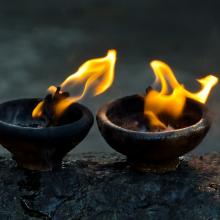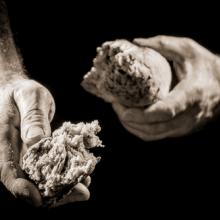sacrifice
RARELY DO YOU see powerful people advocate for the benefit of others outside their “own” political or economic group. There is a tendency on the part of the elite to leverage their privilege for their own benefit while disguising it as public good, as the concept of “elite capture” has exposed. And the state is often complicit in reinforcing policies and practices that concentrate resources into the hands of those who already have enough. In a 1962 sermon titled “A Knock at Midnight” (see Luke 11:5-6), Martin Luther King Jr. diagnosed the state of the nation and church saying, “It is midnight in the social order.” He urged the church to respond to the oppressed who “knock on the door,” even when it’s inconvenient. “How often has the church left [people] disappointed at midnight, while it slept quietly in a chamber of pious irrelevancy,” preached King.
Despite decreasing numbers, the U.S. church wields enormous political and economic power. This month’s readings showcase people — the powerful and the not so powerful — who exercise their agency for the good of those who seemingly have little to offer in return. The texts highlight the church’s moral and theological imperative to employ its power to open the door to the ones who desperately knock. Will the church that gathers in the name of Jesus ignore the state’s complicity in oppressive structures or will it act as the “conscience of the state,” as Dr. King urged? Does the church privilege its own comfort or does it attend to the vulnerable, even at the risk of its own interests? King concluded, “the greatest challenge facing the church today is to keep the bread fresh and remain a Friend to [humanity] at midnight.”
ART CONSERVATIONALISTS RECENTLY discovered a previously unknown Vincent van Gogh painting, a rare find that has excited the art world. On the back of his 1885 portrait “Head of a Peasant Woman,” tucked beneath layers of cardboard and glue, is a hidden self-portrait from early in van Gogh’s career, before he famously cut off his left ear. But the discovery is significant for more than its artistic importance. The hidden self-portrait is symbolic of van Gogh’s larger life and works, illustrating his Christian faith, compassion for the poor, and lifelong struggle with religious rejection.
Van Gogh grew up attending church and wanted to become a clergyman, just like his father, Rev. Theodorus van Gogh. But these hopes were dashed when he was unable to enter religious studies, in part because of behavior considered “eccentric” — a sort of manic shifting of interests. This was an early manifestation of van Gogh’s lifetime of mental health struggles, and the beginning of a complicated relationship with the church.
Spider-Man: No Way Home is the end of a lot of things. It's the end of the (first) Marvel Cinematic Universe Spider-Man trilogy. It’s the end of a lot of speculation about how the multiverse will play into the MCU’s future (since the Loki TV show broke it open). But it also signals the end of the MCU’s innocence — and by extension, superhero movies in general. Spider-Man: No Way Home insists that true heroism looks markedly different from what superhero movies have offered thus far.
We are steeped in a culture that celebrates endless work and the denial of one’s own health. Christian faith leadership demands a counter-witness. Ministry life should reflect a theology of service and commitment both to God and other people, but it should also embody healthy balance and spiritual sustainability for the long work of learning faith and reflecting God’s grace to a world hungry for it.
On any given Saturday, people join Habitat for Humanity teams and commit to work to help eradicate poverty housing. The individual volunteers give of their time, energy and physical ability because they want to be a part of something bigger than themselves. Similarly, in the HBO TV drama “Game of Thrones,” individuals from the fictional continents of Westeros and Essos volunteer to serve as The Night’s Watch. Members of The Night’s Watch live as a self-sufficient military order that defends the Wall that protects the Seven Kingdoms and patrols the Haunted Forest. The Night’s Watch oath details the sacrifice of its members:
"Night gathers, and now my watch begins. It shall not end until my death. I shall take no wife, hold no lands, father no children. I shall wear no crowns and win no glory. I shall live and die at my post. I am the sword in the darkness. I am the watcher on the walls. I am the shield that guards the realms of men. I pledge my life and honor to the Night's Watch, for this night and all the nights to come."
Although the members of The Night’s Watch are fictitious, they exist in a recognizable bond – a commitment that theologians call a covenant relationship.
In the Book of Exodus, readers find the beginnings of the formalized covenant relationship between the Israelites and their god.
EVER SINCE ADAM AND EVE ate themselves out of house and home, we’ve experienced a brokenness in our lives. Rather than offer praise for God’s wondrous acts, we attempt to build God’s kingdom ourselves. Rather than tell of God’s greatness, we whine that religious obligation demands too much. Rather than involve ourselves in the community, we divide into factions over whether we should work or pray, wait or proceed. Still trying to be more god-like than accepting the assignment to bear God’s image in the world, we attempt to make a name for ourselves. The result? Human-initiated plans cast in language that parodies God’s own plan, pitting human counsel against divine. Setting nation against nation.
Pentecost marks a special occasion in the life of the Christian community. This extraordinary record of what we call the “birthday of the church” is less often noted as the 50th day after Passover—a day to pause, gather, and remember the great acts of God. Passover marks the liberation of the enslaved children of Israel from Egyptian oppression, and Pentecost is the moment “the Holy Spirit is poured out by God ... to empower the church to advance Christ’s mission to the very ends of the earth,” as David P. Gushee puts it.
The Pentecost mission involves patience with God’s timing, which is submission to God’s will. Meanwhile, rather than looking up for Christ’s return, we look for opportunities to be evidence that the kingdom has come.
WE LIVE IN an age in which we are encouraged to make decisions that further our personal benefit. This attitude is so pervasive that it extends even to our spiritual lives.
There is a danger in making our faith so personal and inward, so focused on the first commandment to love God with all our hearts, minds, and strength, that we forget to keep the second commandment to love our neighbors as ourselves.
Though our culture would tell us to look out for number one, Christ’s upside-down kingdom offers a different and subversive message: Lose your life and you’ll find it. The church was designed to display the “manifold wisdom of God” by creating a community full of people who, like Jesus, put others before themselves and seek the common good. Christian community is intended to be a living witness, to demonstrate and to anticipate the future of the world that has arrived in the person of Jesus Christ.
In other words, it’s impossible to keep the second commandment without loving God with everything we have, but it’s also impossible to keep the first without loving our neighbors as ourselves.
A thriving common good and the quality of our life together are deeply affected by the personal decisions we all make. The commons—those places we come together as neighbors and citizens to share public space—will never be better than the quality of our own lives and households.
“Christianity” is often used to manipulate, control, shame, judge, and hurt others. It’s influenced by politics, popularity, wealth, success, pride, hate, fear, selfishness, and a desire for power. The poisoning of our beliefs — or theology — happens subtly, under the pretense of tradition, teaching, education, discipline, authority, respect, and religion.
We often treat theology similar to politics, where our beliefs and doctrines are based on which ones benefit us the most.
We strive to get everything we can from our faith, and this can lead to spiritual narcissism, where we become obsessed with maximizing the benefits for ourselves while withholding them from others.
Rarely do we adhere to — or agree with — theological ideas that benefit someone else more than us. Sacrificing our own comforts for the sake of others is absurd — which leads to a sense of divine favoritism.
Our changing cultural values continually affect our spiritual lives and often shape our church experiences. Today’s churches aren’t immune from social trends and factors, and here are a few traditional practices that are becoming extinct within faith communities:
1. Discipline:
In a spiritual climate that’s extremely sensitive and wary of legalism, any type of authoritative action taken by a pastor or church can be highly explosive — often interpreted as aggressive, controversial, and hurtful.
Previous church models of authority and discipline have been so abused, and have such a bad historical reputation, that many Christian communities have simply abandoned the practice of church discipline.
Combine these factors with an overwhelming selection of churches to attend — where any type of discomfort can result in parishioners leaving to go elsewhere — and you can understand why spiritual leaders are reluctant to enforce any type of accountability.
There are so many people that have gone before me, people that have sacrificed their lives in pursuit of justice and equality. Because of this, I feel a deep sense of commitment to honor them by standing for some of the same things that they did. I am in complete awe of two things that connect deeply for me. The first is the cross and how Jesus gave his life for us all. The second is my ancestors who somehow understood Jesus’ sacrifice and passed it onto me through intense persecution.
I can’t say that I know persecution like my parents, grandparents, and great-grandparents knew. I have been back to southern Alabama many times for family reunions and visited slave graveyards where relatives are buried. This compels me to be and do more with my life. I can’t say I understand why Jesus would choose to become human, walk this earth as a human being, and then die at the hands of his own creations to save those who were crucifying him. However, I do know it pushes me to be and do more with my life. I feel like I would let them down somehow if I didn’t take responsibility for addressing injustice with my life.
My life is not my own. I am the product of sacrifice. I am here because of those who saw beyond themselves and thought personal sacrifice was worth giving up to allow justice to take hold. I am here because Jesus modeled something completely illogical on the cross and then some of my ancestors took that example seriously and repeated it. I have no real right to the life I live. My only recourse is to continue the tradition handed to me in the same way.
Women do a lot of work: Moms, grandmothers, aunties, sisters, daughters, wives, teachers, coaches, and any additional caregiving, mentoring position that fills in our lives. Take a moment to pause and reflect on the number of women who have helped you become the person you are today.
In the latest Shriver Report, NBA star LeBron James writes a meaningful tribute to his mother, Gloria, honoring her dedication as a parent and the sacrifices she made in raising her son as a young single mom. Because Gloria was just 16 years old when LeBron was born, they lived with his grandmother. When Gloria’s mother passed away three years later, she and her young son were on their own.
Still a teenager, Gloria did not have the support, education, or resources to sustain her family. The house was lost, and she and her son moved around frequently — a dozen times in three years — counts LeBron.
He writes that “My mom worked anywhere and everywhere, trying to make ends meet. But through all of that, I knew one thing for sure: I had my mother to blanket me and to give me security. She was my mother, my father, my everything. She put me first. I knew that no matter what happened, nothing and nobody was more important to her than I was. I went without a lot of things, but never for one second did I feel unimportant or unloved.”
In effort to model Gloria’s example of devotion, LeBron now takes an active role by helping other kids of single-parent homes through the LeBron James Family Foundation and the Boys & Girls Clubs of America.
“The truth is that everything I’ve learned about being a parent to my boys … I learned from my mother,” he writes in his letter of appreciation to her. “Everything I know about being loving and caring, and sacrificing and showing up and being present in my children’s lives—I learned all of that from her example.”
Without his mother’s influence, would LeBron be the same LeBron?
(Editor's Note: This post was adapted from the author's speech at the Christianity 21 Conference in Denver.)
When I was in seminary, one of my best friends came up with a brilliant theological … pick up line:
"Hey, baby. What’s your hermeneutic?"
Despite the genius of that question, we soon discovered that anytime you start a pick up line with “Hey, baby” you’re in some trouble.
But it’s such a great question. Think of all the relationships that would have avoided painful break ups if they just defined the relationship in the beginning by answering the question “What’s your hermeneutic?"
Muslims in Pakistan, Bangladesh, and elsewhere went online to buy live cows and goats for the traditional Islamic Feast of Sacrifice, known as Eid al-Adha, because shopping on the Internet was easier than going to crowded street markets to buy the animals.
“The purchase of sacrificial animal [online] has gained popularity as it is found to be the most convenient way of buying an animal for the ceremonious day,” Pakistan’s The Nation newspaper reported Wednesday.
After traveling the country this spring — while keeping an eye on Washington, D.C. — I am more convinced than ever that our personal decisions, choices, and commitments will change the world more than our politics. The message in the Epilogue to On God’s Side says this as well as I could do again. It’s short and very practical. Here it is:
The common good and the quality of our life together will finally be determined by the personal decisions we all make. The “commons” — those places where we come together as neighbors and citizens to share public space — will never be better than the quality of human life, or the human flourishing, in our own lives and households.
Here are ten personal decisions you can make to help foster the common good.

Photo via Sergieiev / Shutterstock
Memorial Day is a day to remember. A solemn holiday, it reminds us of the men and women who have died serving our country. Wreath-laying ceremonies and concerts fill the weekend, along with the placing of 250,000 American flags on the graves of Arlington National Cemetery.
Decorating graves is the oldest of Memorial Day traditions. In fact, the holiday was originally called Decoration Day and honored the soldiers who died during the Civil War. Flowers were placed on graves every year on May 30, and after World War I the holiday expanded to include soldiers who died in any war. In 1971, it was moved to the last Monday in May to create a three-day Memorial Day Weekend.
And that, writes Everett Salyer of HEAVEmedia, “is when all hell broke loose.” For many Americans, the holiday became a celebratory weekend filled with grilling meat, drinking beer, splashing in pools, and watching stock car races.
A respectful, bright young high school student asked me yesterday if Baptism and the Eucharist were not merely symbols.
The first thing out of my mouth, I suspect more or less unconsciously (I've never answered in this way before) was:
"When Paul talks about Christ being 'in us' or about 'putting on' Christ does he mean to invoke a metaphor or a reality? Does Jesus really make his home in us by the Spirit or do Christians, when speaking in this way, generally mean that Jesus lives in us only symbolically?"
This hit home — for him, for thirty young adults, and for me.
Editor’s Note: Jim Wallis’ latest book On God’s Side: What Religion Forgets and Politics Hasn’t Learned About Serving the Common Good is sparking a national conversation of what it means to come together on issues that traditionally divide the nation. Bloggers Adam Ericksen and Tripp Hudgins are having that conversation here, on the God’s Politics blog. Follow along, and join the discussion in the comments section.
Benedict of Nursia is on my mind this morning as I ponder what it is that Jim Wallis is trying to accomplish with his new book, On God's Side. Adam Ericksen pondered the virtues of baseball, winning, and losing in his post from earlier this week. Adam questioned the metaphor. What do we do with our losers? How can we all win?
What would it mean if people of faith began transferring their human identities from class, racial, and national loyalties to a global identity in a new beloved community created by God?
~ Jim Wallis, On God's Side
Today I'm wondering about where Jim was when he started pulling all of this together. Jim shared that he went on retreat (a good practice, in my humble opinion) to gather his thoughts for this new book. He went to a monastery (also a good practice, in my humble opinion). He prayed the hours. He wandered the grounds. He spent some time in silence. He read the Narnia books and gave some serious thought of C.S. Lewis' Aslan. All of this led to a question, well, many questions, but this question I've pulled out is what caught my attention. What if, indeed, Jim. What if we were to do this thing ... the beloved community?
It is no surprise to me that this question would emerge while Jim was at a monastery. Of course it would. And that he riffs on Dr. Martin Luther King, Jr., in a way is also wonderfully telling. "Our goal is to create a beloved community and this will require a qualitative change in our souls as well as a quantitative change in our lives," said Dr. King. Our souls must change. So too must our lives. Dr. King said much about the beloved community. So too did Benedict of Nursia.
There's so much to say here. I'm a little stumped. The beloved community is the Church, but it is exemplified by the monastery where people relinquish their individual control of their worldly goods. Monastics take vows to pray and work together. There's a shared rhythm of life. There is a shared mission. It's a challenging and difficult life, and not all Christians are called to it. Obedience, stability, conversion of life. If we want to be the beloved community, then the we must avow ourselves to such a Rule. Indeed, we must give up our personal or private identities to the service of all.
But how do we do this as a culture, a global church?
What would an “atheist Lent” look like? A group of young nonbelievers are finding out, observing the Christian practice minus its religious context.
They have given up alcohol, animal products, and various Internet and cellphone interactions. One has vowed to make a daily Lenten practice of telling those he encounters how important they are to him.
But their observance of the 40-day period in which many Christians abstain from worldly desires in a bid to come closer to God has upset some atheists who say borrowing religious traditions is antithetical to nontheism.
The exercise has also illustrated a divide in the nontheist community – between older atheists who see religion as inherently evil and younger atheists who are more open to interactions with religious belief.
At the center of Christianity is a weird claim: that we have been saved by sacrifice. And it was a gruesome sacrifice at that, a snapshot of humanity at our worst, for the Christian claim is that what saved us was the torture and putting to death on a cross of an innocent man falsely charged as a criminal. Weird doesn’t begin to describe the strangeness of this idea. The talented and thoughtful writer, Colm Toibin, has taken the church to task regarding this claim. As quoted by Maureen Dowd about his one-woman show opening soon on Broadway, The Testament of Mary, Toibin says this: “The idea that we were somehow saved and redeemed by a crucifixion seems strange to me. The idea of human sacrifice is something we really have to think about, even people who are practicing Catholics, the idea of taking a single individual for the sake of any cause.”
I have been thinking a lot about the idea of human sacrifice lately. In fact, I’ve been up to my eyeballs in it because I’ve been editing a new introduction to Christianity by the Catholic theologian James Alison. At the center of his course is an insight about how a death on a cross could have redeeming qualities. Here’s how Alison understands what happened at the cross: Jesus did not invent human sacrifice and going to his death on a cross was not an endorsement of the torture and murder of innocent victims. It was an exposé. What we have in the Gospel accounts of Jesus’ Passion is a fairly complete picture of how human beings, without any assistance from God, have saved our own necks by crucifying someone else. We commit sacrifice when we scapegoat, demonize, marginalize, expel, persecute or kill others in the name of our own safety and security or to bolster our belief in our own goodness. As the Gospels tell us rather directly, enemies become reconciled when they can find a common enemy to unite against: “That same day [the day of the crucifixion] Herod and Pilate became friends with each other; before this they had been enemies.” (Luke 23:12)
A day of darkness and gloom, a day of clouds and thick darkness!
-Joel 2:2
Who in their right mind looks forward to Lent? Seven weeks of preparation to lead up to Good Friday hardly seems like an enjoyable way to spend our time.
Why not work on those New Year’s resolutions that have already been slipping instead? How about some more quality time with the family? What good, after all, can come from dwelling on darkness and death for more than forty days?
How about we all just agree to skip Lent this year and just get back together on Easter, okay?


















